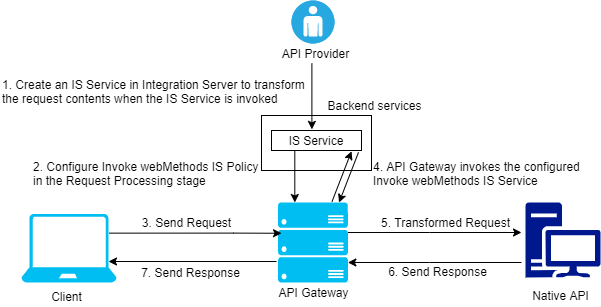How do I transform a request using Invoke webMethods IS policy?
Use the Invoke webMethods IS policy to modify the contents of an incoming request such as headers, payload, query parameters, path parameters, HTTP method using the configurations given by the API Provider.
The Invoke webMethods IS workflow is as follows:
1. The API Provider creates an IS Service in Integration Server in which API Gateway is running. The API Provider configures the IS Service to transform the request contents as per their need.
2. The API Provider configures the Invoke webMethods IS policy in the Request Processing stage of API Gateway with the created IS Service.
3. The client sends the request to API Gateway.
4. API Gateway invokes the webMethods IS Service configured by the API Provider. The IS Service transforms the request contents as defined by the API Provider.
5. API Gateway sends the transformed request to the native API.
6. Native API processes the transformed request and sends the response to API Gateway.
7. API Gateway forwards the response to the client.

To configure Invoke webMethods IS policy in the Request Processing stage:
1. Click APIs in the title navigation bar.
A list of available APIs appears.
2. Select a Rest API from the list of APIs and click Edit.
3. Select Policies > Request Processing > Request Transformation.
The Request Transformation section appears.
4. In the Condition section, select OR.
The configured transformation is applied when at least one of the conditions is satisfied.
Note:
The condition can also be set to AND operator. The configured transformation is applied only when all the set conditions are satisfied.
5. Click Add Condition to configure the conditions to evaluate the contents on the request.
a. Specify the Variable. Example, Content-Type.
b. Specify the Operator to use to relate variable and the value provided. Example, Equals.
c. Specify the Value. Example, application/json.
When you select the operator - Equals, the Condition checks if the Variable: Content-Type is equal to the Value: application/json.
d. Click Add.
6. Select Transformation Configuration > Advanced Transformation.
The Advanced Transformation section appears.
7. In webMethods IS Service section, click + Add webmethods is service.
8. Provide the following information.
 webMethods IS Service
webMethods IS Service. Specify the webMethods IS service to be invoked to process the request messages.
You can add multiple services by clicking

.
Note:
The webMethods IS service must be running on the same Integration Server as API Gateway.
 Run as User
Run as User. Specifies the authentication mode to invoke the IS service. If this field is left blank the incoming credentials of the user, identified by
API Gateway, is used to authenticate and invoke the IS service. You can also specify a particular user, you want API Gateway to use to invoke the IS service.
 Comply to IS Spec
Comply to IS Spec. Mark this as
true if you want the input and the output parameters to comply to the IS Spec present in pub.apigateway.invokeISService.specifications folder in wmAPIGateway package.
 webMethods IS Service alias
webMethods IS Service alias. Specifies the webMethods IS service alias to be invoked to pre-process the request messages.
9. Click Save.
This Invoke webMethods IS policy modifies the contents of an incoming request based on the IS Service invoked.


 .
.